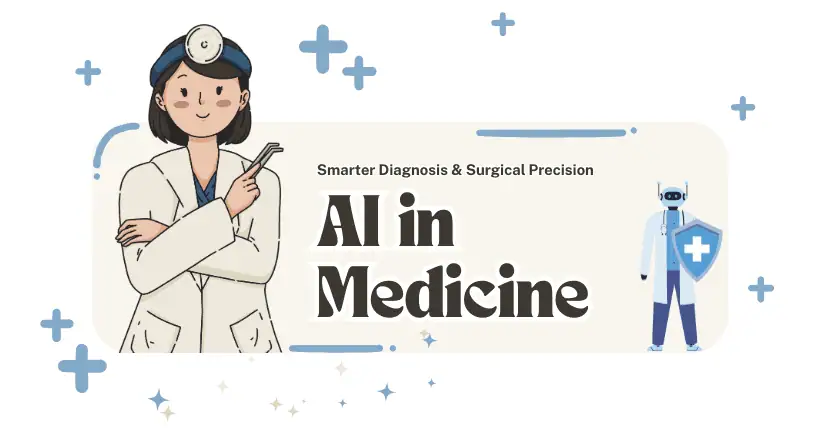Technology is changing our lives, and every one of us is more or less enjoying the benefits brought by technological advancement.
The 5G network enables fast remote data transmission, making it possible for a doctor thousands of miles away to perform a real-time remote surgery—something that once seemed magical is now a reality.
What changes will the emergence of AI bring to our healthy lives?
Let’s talk about it today!
01
Why does a healthy life need AI?
Throughout life, one of the most fundamental wishes is lifelong health.
With this beautiful subjective expectation, we must objectively face the potential illnesses we may encounter—that is real and vivid life.
In fact, for billions of years, humans have been constantly observing the sunrise and sunset, the mountains and rivers, the bloom and fall of seasons, temperature changes, emotions, and more to identify valuable information and develop various health-related experiences and knowledge.
For example: After the beginning of spring, the temperature fluctuates greatly and changes frequently. People add or remove clothing based on the weather to stay warm, effectively avoiding colds caused by wind and cold.
Guided by these experiences and knowledge, we may be able to delay or even prevent the onset of certain diseases.
Before the arrival of AI, ordinary people often faced the following difficulties in acquiring various health experiences and knowledge:
The vast knowledge from predecessors is overwhelming and hard to fully learn and master. Every person is unique, so some experiences and knowledge may not be suitable for everyone. Although we can search online, the accuracy of some information is unreliable and therefore not applicable.
With the emergence of AI, perhaps everyone can have their own intelligent health expert:
When in doubt, ask AI: AI is now deployed on mobile phones, allowing us to ask questions at any time and get timely responses.
Logical reasoning reduces hallucination: Today’s rapidly developing AI has significantly reduced inappropriate “hallucinated” responses. AI with logical reasoning capabilities now possesses sufficient intelligence.
Health data analysis: Various data recorded by electronic devices—such as heart rate, blood pressure, and blood oxygen—can be analyzed by AI to generate personalized health reports.
For example, I submitted some of my basic information to AI, and it generated a three-month fitness plan for me. The AI fully considered my personal preferences, feasible exercise options, and fitness goals—it was completely tailored and absolutely fantastic!
02
Why does the medical field need AI?
Scientists generally agree that the human body is a complex and sophisticated system.
This system is composed of many components that work closely together to maintain normal functioning.
Diagnosis
If any component in the human body malfunctions, medical staff use various instruments to scan it and obtain basic data—such as X-rays, CT scans, and MRI images.
Normally, these basic data are just numbers and indicators, and it requires experienced medical personnel to determine whether there are abnormalities.
With AI, it can analyze large volumes of healthy baseline data and compare them with abnormal data to help medical personnel quickly identify problematic areas.
For example, an AI imaging diagnostic system developed by a hospital can reduce the diagnostic time for a single report by 40% and decrease the rate of missed and incorrect diagnoses by 80%.
Surgery
Beyond diagnosis, AI is increasingly being applied in surgeries.
Robotic surgical systems like the Da Vinci Surgical Robot have demonstrated excellent performance in many complex surgeries. For example, an AI-assisted joint surgery robot used by a certain hospital improved bone-cutting precision to 0.1 millimeters through pre-operative planning.
These systems, equipped with high-precision robotic arms and 3D high-definition visual systems, provide medical personnel with a more stable and precise operating environment.
Moreover, AI can also analyze real-time data to offer optimal surgical path suggestions to medical staff.
Treatment Plans
With the development of gene sequencing technology, personalized medicine has become possible.
AI can process and analyze large amounts of genetic data to help medical staff develop personalized treatment plans.
For example, in cancer treatment, AI can analyze a patient’s genetic information to predict drug responses and thus select the most appropriate therapy.
03
Can we fully rely on AI?
With AI being so useful, can it solve all problems in health and medicine?
The answer is: No.
AI still faces many challenges in real-world applications:
- Data security assurance: Medical data is mostly private personal information. If all of it is handled by AI, then AI must possess a high level of data security capabilities.
- Difficult diseases still unsolved: Researchers are still studying certain diseases. AI relies on existing knowledge and data, so it cannot handle unknown diseases.
- More complex ethical issues: AI deals with data and solves technical problems. Complex moral and ethical issues are beyond AI’s scope.
As a tool, AI is very effective in helping ordinary people or medical professionals free themselves from repetitive tasks, improve efficiency, and focus on solving difficult problems.
The best current model is human-AI collaboration: human-led + AI-assisted.

Disclaimer:
- This channel does not make any representations or warranties regarding the availability, accuracy, timeliness, effectiveness, or completeness of any information posted. It hereby disclaims any liability or consequences arising from the use of the information.
- This channel is non-commercial and non-profit. The re-posted content does not signify endorsement of its views or responsibility for its authenticity. It does not intend to constitute any other guidance. This channel is not liable for any inaccuracies or errors in the re-posted or published information, directly or indirectly.
- Some data, materials, text, images, etc., used in this channel are sourced from the internet, and all reposts are duly credited to their sources. If you discover any work that infringes on your intellectual property rights or personal legal interests, please contact us, and we will promptly modify or remove it.








